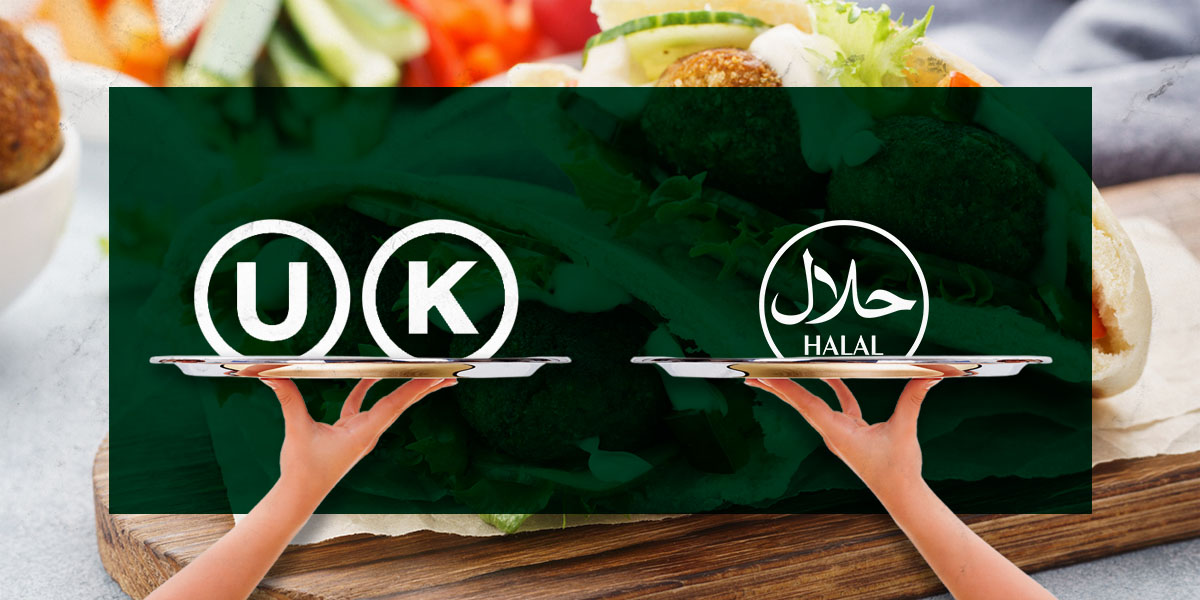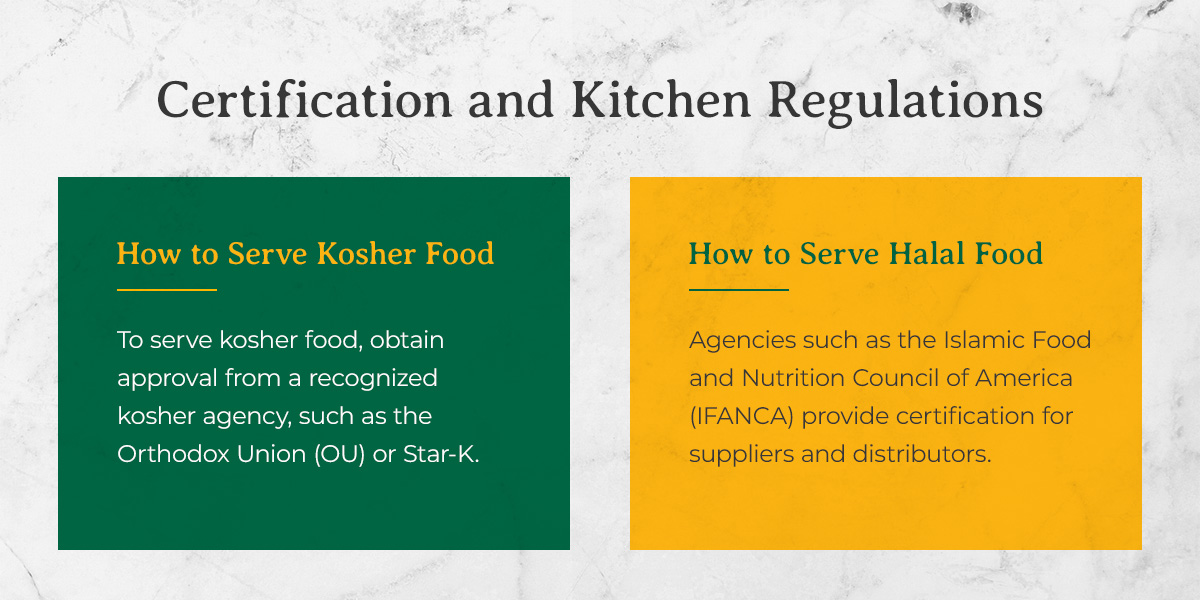Kosher vs. Halal: A Guide to Serving and Supplying

Kosher vs. Halal: A Guide to Serving and Supplying
Serving kosher and halal foods can expand your customer base and enhance your brand’s reputation. Food facilities that incorporate these dietary options demonstrate inclusivity, which opens their doors to diners who follow religious dietary laws. You can welcome all kinds of customers — and build loyalty with people who have a hard time finding places that meet their needs.
However, doing so requires attention to detail, knowledgeable staff and reliable sourcing to ensure compliance with religious standards. Explore the difference between kosher and halal food, how to get certification and serving best practices.
Defining Kosher vs. Halal Food
Before adding kosher or halal options to your menu, it’s essential to understand what these diets involve. Both originate from important cultural traditions and have specific guidelines for how foods are sourced, prepared and served.
Kosher
Kosher means “fit” or “proper” in Hebrew and refers to food that meets Jewish dietary laws derived from the Torah. Kashrut, the body of Jewish law governing these practices, categorizes foods into three main types:
- Meat: Animals that have split hooves and chew their cud, such as cows, sheep and goats, are considered kosher. Meat must be slaughtered according to the shechita method by a trained Jewish individual called a shochet. Proper slaughtering ensures an animal is killed humanely and that the blood is drained efficiently, because consuming blood is prohibited.
- Dairy: Dairy products must come from kosher animals and must never be mixed with meat. This separation extends to cooking, serving and cleaning utensils, as any cross-contact would render a dish non-kosher.
- Parve: This classification includes neutral foods such as vegetables, fruits, grains, eggs and other foods that are neither meat nor dairy, which can be eaten with either category. Parve ingredients often serve as a flexible base for creating compliant meals.
Halal
Halal means “lawful” or “permitted” in Arabic and is rooted in Islamic law as outlined in the Quran. In a culinary context, halal principles guide which foods are allowed, and how they’re prepared and consumed.
Halal foods must meet the following criteria:
- Permissible animals: Similar to the kosher laws, halal rules define acceptable animals, such as cows, sheep, goats and poultry. Pork and its derivatives are prohibited, and seafood may be considered permissible depending on which school of Islamic jurisprudence a person follows.
- Proper slaughtering: Halal meat must be slaughtered humanely by a knowledgeable Muslim while invoking the name of Allah before making the cut.
- Dietary considerations: Halal rules prohibit alcohol, blood and any intoxicants, and they influence food handling, preparation and storage. While halal does not separate food types, it emphasizes the prevention of contamination with non-halal or haram (forbidden by Islamic law) substances.
Differences in Kosher vs. Halal Dietary Rules
By understanding the differences between kosher and halal dietary rules, you can serve your customers confidently. Both diets share some similarities in restricting certain animals and requiring ethical slaughtering, but a few distinctions affect menu planning and kitchen operations:
- Prohibited animals: Kosher law prohibits pork, camel, rabbit and shellfish, while permissible fish must have fins and scales. Halal rules prohibit the consumption of pork and its by-products. Seafood may be permissible in some cases.
- Slaughter methods: According to kosher laws, the slaughter process requires a precise cut to the throat with a sharp knife. Any knowledgeable Muslim may perform halal slaughter using a swift incision to the throat and letting the blood drain completely.
- Food combinations: For food to be considered kosher, meat and dairy can never be mixed. For halal, there are no restrictions on combining meat and dairy. The primary focus is on ensuring that all ingredients are halal-certified and that no contamination with prohibited foods occurs.
- Alcohol: In kosher, alcohol is permissible if derived from kosher sources. Wine and grape juice have additional rules and often require supervision to maintain kosher status. For halal, alcohol is prohibited in all forms, including in cooking, flavoring or as an ingredient in sauces.
Certification and Kitchen Regulations
Certification and operational practices ensure kosher and halal foods meet religious standards and maintain customer trust.
How to Serve Kosher Food
To serve kosher food, obtain approval from a recognized kosher agency, such as the Orthodox Union (OU) or Star-K. Kitchens need to maintain separate cookware, plates, utensils and washing areas for meat and dairy.
Staff must follow strict protocols to prevent cross-contamination, which includes dedicated preparation areas and storage.
How to Serve Halal Food
Halal certification confirms that products meet Islamic dietary standards. Agencies such as the Islamic Food and Nutrition Council of America (IFANCA) provide certification for suppliers and distributors.
Operators must prevent cross-contamination with haram foods. This may involve using separate utensils, preparation surfaces or storage areas. Attention to ingredient verification and handling is critical.
Sourcing Kosher vs. Halal Ingredients and Reading Labels
Proper sourcing is critical when offering kosher and halal foods. Food service operators need to understand the supply chain intricacies and the certification requirements to maintain compliance and quality:
- Supply chain considerations: Make sure every step of the supply chain, from farm to fork, adheres to kosher and halal standards. This includes verifying the practices of suppliers and understanding how products are processed, stored and transported.
- Certification symbols: Packaging often carries recognizable certification symbols. For kosher, common symbols include OU, KOF-K, and Star-K. For halal, look for IFANCA, Halal Food Authority (HFA) or Halal India symbols. These icons confirm that a product has been evaluated and meets the respective religious requirements.
- Ingredient verification: Review labels for noncompliant additives, emulsifiers or flavorings. This is important for semi-prepared foods, sauces and individual ingredients like spices, which may contain hidden animal derivatives or alcohol.
Food operators can also collaborate with a food distributor experienced in kosher and halal food to simplify compliance. They can provide guidance on sourcing, storage and handling so that all ingredients meet necessary standards.
How to Label Kosher and Halal Foods on Your Menu
For restaurants that serve halal and kosher meals, clear and accurate menu labeling is essential. Proper labeling helps guests make informed choices and reinforces your establishment’s credibility and respect for dietary observance:
- Use recognized terms: Clearly indicate whether a dish is kosher, halal or both. Specify halal-certified chicken or kosher dairy dessert.
- Include certification details: If your dishes use certified ingredients, reference the certification where possible.
- Avoid cross-category confusion: Ensure that menu sections and item descriptions don’t mix categories in ways that might cause misunderstanding. For instance, kosher menus should separate meat and dairy listings, while halal menus should indicate items free from prohibited products.
Partner With Feeser’s Food Distributors for Your Dietary Supply Needs
If you’re ready to expand your kosher and halal offerings, Feeser’s Food Distributors can make it simple for you. We have over 125 years of experience serving food sales operators in the entire Mid-Atlantic region with fresh and frozen foods from top national and exclusive brands. Our team understands the sourcing, handling and certification requirements for kosher and halal foods.
From raw ingredients to semi-prepared and ready-to-serve items, we ensure you get what you need on time, at the best value and with a smile. Contact us today to learn more about our services.


